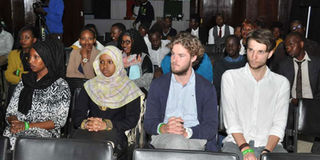Campaigns equip youth with skills that improve their lives

Participants at one of the #DefendMyFuture campaign sessions. FILE PHOTO | NATION MEDIA GROUP
Moments before the attack on Westgate Mall on September 21, 2013, Kevin Osido, 35, had been sitting at Artcaffe at the mall waiting for a friend.
“Since he was late, I decided to go and see a dentist in town,” recalls Osido. While waiting at the reception for his turn to see the doctor, he saw the breaking news: “Westgate Mall under attack”.
“I went back to the Westlands immediately to find out what had happened. I had many friends working there. It was like a second home to me since it was just across the road from my house. There were many ambulances and many people with serious injuries. I realised that this was not an ordinary bank robbery as I had been told by the security officer at our gate when I called him earlier. I spent the whole day there talking with other people and the security personnel,” he recalls.
“But the most disturbing and haunting images were those of the badly-injured women and young children. I kept asking myself why?” he adds.
From his house across the road, he got a good view of the events around the mall that evening as more survivors were rescued.
For the next few days, Osido spent days and nights outside the mall, talking to Kenya Defence Forces (KDF) and Recce Squad personnel about the security situation and volunteering in the rescue operations together with seven of his neighbours.
“I learnt that most terrorist attacks are planned and executed by people between the ages of 14 and 34, although radicalisation can begin even earlier,” he says.
The incident got him thinking about how the country could be made secure, how the youth could be spared from radicalisation, and how they could be used by terror groups to fight the country.
“This motivated me to start County Governance Watch (CGW) a non-governmental organisation that offers forums for discussions on strengthening the county governance systems and making the voices of the people count in the management of their resources and decision-making in their affairs,” says Osido.
A 2015 report by the UN’s Regional News Service estimates that 255 people had left Kenya to join Al Shabaab since 2013. But the figure could be higher, given that in Isiolo County in eastern Kenya alone, nearly 200 children have been reported missing since 2014 and are believed to have crossed into Somalia. The recruiters typically look for males between the ages of 15 and 30, who are easy prey since they are jobless.
Data for 2016 from the East African Institute shows that 70 per cent of unemployed Kenyans are 34 years old and
below. Yet universities and colleges continue releasing almost a million young graduates into the market every year, even though few jobs are being created. Disillusioned, some vent their anger at the government by joining terrorist groups like Al Shabaab.
“That is partly why CGW is running the #DefendMyFuture programme to provide safe spaces for dialogue for the youth through anti-radicalisation campaigns,” says the former student leader of Daystar University Students Association and Chair of the Daystar University Alumni Association.
He says one of the telltale signs of radicalisation is when a student skips classes to chat with strangers online for hours on end. These strangers give them false hope and money, he notes.
Eradicating radicalisation calls for the formulation of policies at both the county and the national government levels. “But it is at the level of county governance where a lot of pressure is felt when youth who feel disenfranchised idle around, especially in this era of mobile phones. You can imagine what these devices can do. Do we use them to make or break?” he asks in reference to the more than a million youths who scored a mean grade of D or lower in the 2016 and 2017 Kenya Certificate of Secondary Education.
#DefendMyFuture looks at opportunities at both the national and county levels to enable the youth to nurture and accomplish their dreams. In the past two years the programme has been launched at nine institutions, which have implemented youth anti-radicalisation programmes, reaching some 28,000 university and college students.
CGW has been working with 27 county governments, with Nairobi leading in the implementation an anti-radicalisation and violent extremism programme aimed at providing forums for debate between ordinary citizens and security officers. These activities have been achieved largely through volunteer staff at CGW in partnership with organisations such as Saferworld and Pact, among others, with the National Counter-Terrorism Centre (NCTC) providing the content for the discussions.
The #DefendMyFuture campaign has equipped university and college students with soft skills to identify positive and negative activities, and to choose those that add value to their academic journey, personal lives and professional development.
“When they log on to the Internet, they know what to look out for,” offers Osido.
In 2016, CGW held the first national youth conference on countering violent extremism, anti-radicalisation and peaceful elections at the Jaramogi Oginga Odinga University in Bondo, Siaya County, which brought together 1,800 youth leaders from 33 educational institutions and 23 counties. In 2017, it held its second conference, which brought together 470 youth leaders, at the International Leadership University (ILU) in Nairobi.
These platforms give the youth opportunities to discuss their role in the country’s political environment and make recommendations to various bodies on how to conduct free, fair, credible and transparent elections. They also discuss radicalisation at length. He says it is an issue that will continue to preoccupy the minds of many young people, given the current tense political situation.
Part of the deliberations dealt with the need for counties to invest in the youth and youth-friendly policies. “Most importantly, the participants draw up county-specific youth action plans on countering violent extremism and these are supposed to feed into what we call the County Action Plans on Countering Violent Extremism that are drawn from the Kenya National Strategy on Countering Violent Extremism. If implemented, these plans would see counties invest in youth development, which would reduce inter-county youth migration in search for jobs,” he says.
Though implemented by CGW, #DefendMyFuture campaign is a concept that is fully-owned by the youth. “Students from the International Leadership and Daystar universities wrote the funding proposal to produce a video for the campaign, which won CGW the prize for the Best Counter Narrative Award by the Institute for Strategic Development and Google at the Regional Conference on Countering Violent Extremism in June 2015 in Nairobi. CGW used the Sh100,000 award to craft messages, act, shoot and edit the video, which was launched on January 26.
The consequences of radicalisation
When youths get radicalised, there is always the risk of an attack, often with loss of lives.
“Sadly, when an attack occurs, it is innocent women and children who suffer more. They are the future that we are trying to defend in our small ways,” says Osido.
Radicalised youths engage in non-productive activities and the country suffers loss of labour. This causes the economy to stagnate and is retrogressive, he points out.
Radicalisation stems from general lack of patriotism, which is against the national values laid down in the Constitution for the achievement of the country’s Vision 2030. Instead of national cohesion, radicalisation leads to war and bad blood between the citizens and security forces.
“Look at Eastleigh. It would take a lot of civic awareness and a softer approach to civilians on the part of our security forces. There is some progress since we started the anti-radicalisation programme,” he notes.
The wheel of radicalisation can be stopped only by prevention. Empowering the youth on anti-radicalisation and de-radicalisation is necessary, he adds.
Through the series of meetings in the counties, CGW has been hosting inter-faith meetings bringing together Muslim and Christian clerics and people of different faiths to understand radicalisation and religious terrorism.
“These are emotive deliberations, during which different faiths voice their concerns. In the end, they find common ground on how to co-exist,” he adds.
There is a need for universities and counties to partner in creating awareness about anti-radicalisation among the youth. “I am happy that the government has established the National Counter Terrorism Centre, which coordinates all anti-radicalisation programmes, and that there is a national strategy as well. We all need to embrace it,” he says.
Not surprisingly, Osido’s work comes with great risks.
“More than twice my car has been broken into and computers, phones and other equipment stolen. When I was living on Peponi Road, the security guard told me that on several occasions strangers had sought access my house,” he says.
“I remember GSU and Recce Squad officers telling me, ‘Now we should give you a gun.’ But I refused, although that was in 2015; things have changed. Besides, those who have guns don’t announce it. It is part of the training,” he says with a smile.
But when travelling around the country, he takes great care.
“Sometimes we ask security personnel to frisk the participants coming to our meetings. I remember during one session in a county, the county commissioner sent us 12 armed police officers. This work is risky. You don’t take chances”, he adds.
Given the sensitivity of his job, Kevin leads a quiet, simple life. “I deliberately avoid confrontation or even arguments with strangers because I do not know their motives,” he says.





